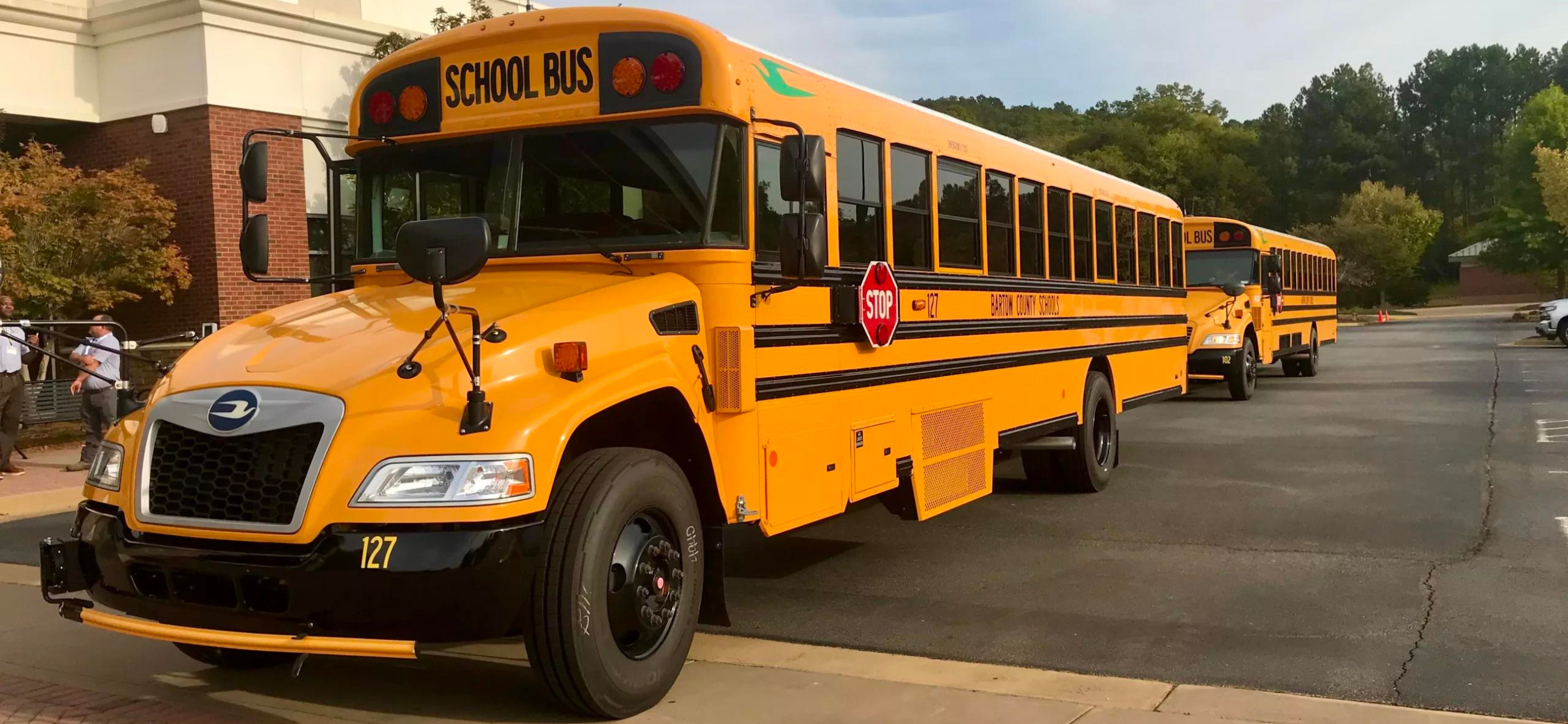Stay ahead of the curve as a political insider with deep policy analysis, daily briefings and policy-shaping tools.
Request a Demo
School buses line up in Bartow County. (Credit: Jill Jordan Sieder)
- New legislation targets student health, specifically opioid-related overdoses and deaths
- The penalty for passing a stopped school bus in Georgia is now the harshest fine in the nation
- Other legislation addresses the effects of online bullying and limits internet access in school
It’s back-to-school season in the Peach State, and things are bound to look somewhat different both inside and outside the classroom.
As you grapple with school supply shopping, figure out bus routes and try to get back into the routine of school, it’s also worth taking a look at the new education laws that went into effect this summer.
State Affairs has compiled a rundown of recent legislation that could mean major changes for students, parents and educators.
Inside the classroom
Senate Bill 395 requires public schools to make a “reasonable effort” to stock an opioid antidote to treat overdoses related to substances such as fentanyl. This act was passed following an incident in May at Dunwoody High School, where a student suffered acute fentanyl intoxication and later died.
Fentanyl-related deaths have become a major issue across Georgia, with fentanyl-involved overdose deaths increasing by 800% among adolescents in 2021, according to the Georgia Department of Public Health.
To further invest in students’ health, House Bill 874 requires Georgia public schools to carry an automatic external defibrillator to use in cases of cardiac arrest.
Georgia’s recent legislation will also bring major changes for school employees.
Lawmakers passed a $36.1 billion budget for the 2025 fiscal year, investing more into Georgia’s workers. K-12 teachers will receive a $2,500 raise while state employees, including public university workers earning under $70,000, will receive a 4% raise.
Also, Senate Bill 105 increases pensions for school employees whose positions do not require teaching credentials, such as bus drivers and food service workers.
But the improvements don’t stop at higher salaries. Full-time school district employees will now receive double the parental leave — up to six weeks — thanks to House Bill 1010. That includes time off for childbirth, adoption or foster care placement.
Outside the classroom
Beyond changes in the classroom, several of the new laws address dangers that may occur off-campus.
House Bill 409 quadruples the penalty for passing a stopped school bus to a minimum of $1,000 and includes possible jail time. The fine puts Georgia among the two states, along with Utah, with the harshest penalty for passing a school bus.
The act, also known as “Addy’s Law,” additionally calls for the modification of bus routes to minimize street crossings following the death of Adalynn Pierce, an 8-year-old student from Henry County who was killed while crossing the street to her school bus.
Another transportation law, House Bill 51, allows students to be transported in vehicles smaller than traditional school buses. This law was created to curb the costs schools have historically faced when transporting small numbers of students for extracurricular activities.
Other Georgia laws may affect students and parents when it comes to selecting their method of education for the upcoming school year.
Starting this fall, Senate Bill 233, also known as the “Georgia Promise Scholarship Act,” gives parents $6,000 per school year if they remove their child from a low-performing public school and instead opt for homeschool or private education. The law also allows kindergarteners to go straight to private school education without having to enroll in public school.
On the internet
With internet and social media use on the rise, recent Georgia legislation also addresses educational concerns in the virtual sphere.
Senate Bill 351, the “Protecting Georgia’s Children on Social Media Act of 2024,” was a priority of Lt. Gov. Burt Jones, who signed it into law this April to address the harmful effects of online bullying. The bill requires school boards to limit internet access on school-owned devices.
Beginning in the 2025-26 school year, the Georgia State Board of Education will be required to develop instructional programs to teach students about online safety.
The act also holds social media platforms and websites accountable for who is able to access their content. Platforms can now be fined $25,000 for failing to reasonably confirm that users are over the age of 16, and porn sites can be fined upward of $10,000 for allowing access to minors.
You can reach Nava Rawls at [email protected] or on X @navarawls.
COMMENTARY: Happy 100th birthday, Mr. Jimmy!
“I missed you at Sunday school today,” Mr. Jimmy said to me as he entered the back door of what once was a boarding house where his parents lived when they were first married. He always stopped to speak with me in the kitchen before mingling with the nearly 45 people gathered in anticipation of …
Want to see the election process up close? Become a poll worker
Looking for a temporary job that gives you a glimpse of how the American election process works? If so, Georgia election officials are looking for you. Many local election offices have begun training thousands of temporary poll workers and other essential staff for the Nov. 5 general election, according to W. Travis Doss III, president …
Rogers, Slotkin lean into China, national security in US Senate battle
LANSING, Mich. — Michigan voters are faced with a choice for U.S. Senate in November between two candidates with strong national security credentials but with sharply different views on how to effectively address threats to the U.S. Both Southeast Michigan candidates, Republican Mike Rogers of White Lake and Democratic U.S. Rep. Elissa Slotkin of Holly, have been …
Tammy Baldwin faces tough reelection: Can Trump supporters push her past the finish line?
MADISON, Wis. — Tammy Baldwin may need some Donald Trump supporters to secure her reelection. The two-term U.S. senator plays up the “buy American” language she pushed for federal infrastructure projects and touts policies favored by Wisconsin’s dairy industry such as seeking to ban labeling plant-based products “milk.” Her GOP rival Eric Hovde, meanwhile, wants …




